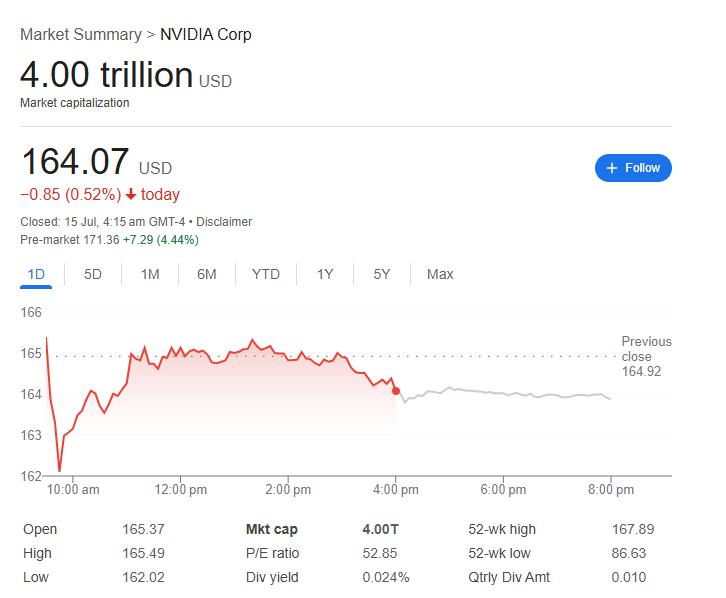Nvidia Makes Memes, AI, Money as H20 Chip Sales to China Resume
Nvidia gets U.S. approval to ship H20 AI chips to China, reversing export curbs—huge for AI, stocks, and geopolitics.
A Sudden Reboot in the Chip Wars
Back in April, the U.S. government slammed the brakes on Nvidia’s H20 artificial intelligence (AI) chip exports to China. The fallout wasn’t subtle. Nvidia failed to meet expectations by about $1.2 billion in Q1, warned of an $8 billion Q2 hit, and took jaw-dropping $4.5 billion inventory hit. It looked like the AI chip party—at least in China—was over.
Hoodlum 🇺🇸@NotHoodlum七月 15, 2025Nvidia said it has received assurances that it can sell its artificial intelligence chip in China, following a meeting between its Chief Executive and Trump.
The reversal comes after Trump’s Commerce Department restricted sales of the chip in April, costing the company billions. pic.twitter.com/WMehuNnEfc
Then came a plot twist straight out of Silicon Valley fan fiction. Nvidia announced that it’s filing fresh license applications to resume H20 chip shipments to China, with the U.S. government reportedly planning to approve them. Cue the stock market fireworks.
So, What Is the H20 Chip?
The H20 is part of Nvidia’s China-specific lineup—a slightly “nerfed” version of its H100 GPU, designed to stay within the boundaries of U.S. export controls. While it doesn’t have the raw muscle of Nvidia’s flagship chips, it’s still a formidable piece of hardware, purpose-built for enterprise AI, data centers, and cloud computing. Think of it as a clever compromise: powerful enough to meet Chinese demand, but not scary enough to trip Washington’s security alarms.
Li Zexin@XH_Lee23七月 14, 2025The Chinese market is so important that NVIDIA CEO has come to China 3 times in just 7 months.
Btw. Isn’t he feeling hot? Wearing a leather jacket in Beijing’s summer!?!? pic.twitter.com/DjGVpx0sj0
With the H20 back in play, Nvidia isn’t just re-entering the China market—it’s doubling down on a strategy that straddles profit and policy.
Wall Street Loves a Good Plot Twist
Predictably, Nvidia’s share price soared. The company is hovering around a $4 trillion market cap, and this China green light adds another growth chapter to the AI gold rush. For suppliers like Samsung, which provides memory for the H20 and other Nvidia chips, the news was equally bullish. Analysts expect surging demand for HBM3 and GDDR7 memory—the key pieces of tech that enable the latest chips.

Nvidia's market cap at the time of writing (screenshot).
Nvidia’s stock story has been one of dominance, innovation, and just enough political maneuvering to stay ahead of regulation. With China back in the revenue column, the company may claw back billions that looked lost just weeks ago.
The Tightrope Between Politics and Profit
Of course, this isn’t just about hardware. It’s a diplomatic balancing act with Jensen Huang as its acrobatic lead. Nvidia’s CEO has been walking a tightrope—meeting with American lawmakers one day and flying to Beijing the next. His pitch? Letting Nvidia sell to China isn’t a national security threat—it’s an economic necessity for the U.S. to remain AI-relevant. Indeed, he’s even telling the U.S. to onshore much of its tech manufacturing.
Washington doesn’t exactly agree, especially when it comes to “dual-use” concerns—tech that could power both industry and military. But Huang insists that the H20, like the newer RTX Pro variant just launched, is designed for civilian applications like logistics, industrial automation, and cloud services. That might be true for now—but long-term, the game is bigger than any one chip.
China’s Not Just Waiting Around
While Nvidia’s licenses get rubber-stamped, China isn’t sitting idle. Beijing is throwing massive resources at developing homegrown AI chip alternatives. Nvidia may be back in the market today, but the long-term play for China is tech independence. That means Nvidia’s position—though strong—might not be as permanent as investors would like.
People's Daily, China@PDChina七月 15, 2025Jensen Huang, CEO of US tech giant Nvidia, on Tuesday praised China's rapid advancements in artificial intelligence (AI) during his visit to Beijing, describing the Chinese market as both "large" and "dynamic."
Huang emphasized China's strong talent pool, noting that China is… pic.twitter.com/n3ELHtqkv5
This return to the Chinese market is undeniably a big win, but it may also be the start of a much fiercer race, one where geopolitical tensions and technological supremacy are fully intertwined.
The Takeaway
Nvidia’s resumption of H20 chip sales to China is more than a licensing update—it’s a turning point. The company is poised to recover billions in lost revenue, with financial upside extending to memory suppliers like Samsung and other players in the AI chip ecosystem.
But this is also a story of timing: Nvidia’s presence in China depends on a fragile balance between regulatory permissions and fast-moving competition. The U.S. wants to keep cutting-edge AI out of Beijing’s hands, while Nvidia wants to maintain its global dominance. For now, the two have found a workaround. But the tension between profit and policy isn’t going away—it’s just entering a new chapter.
For more stories around the edge of finance and tech, visit our Trending section.